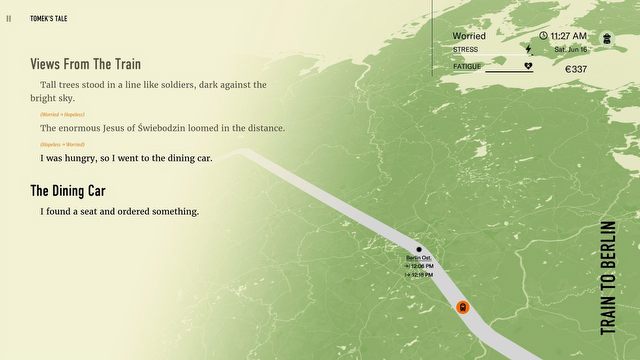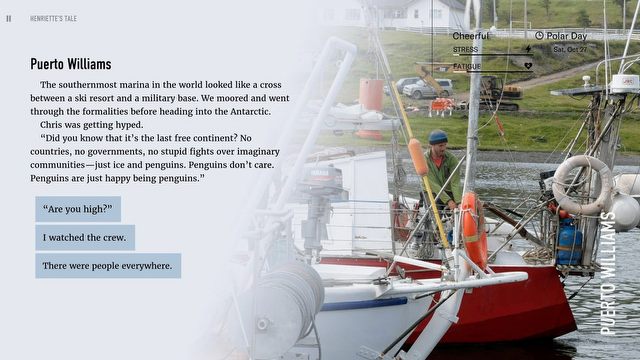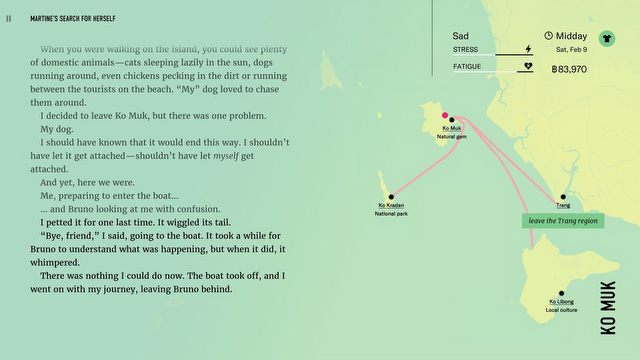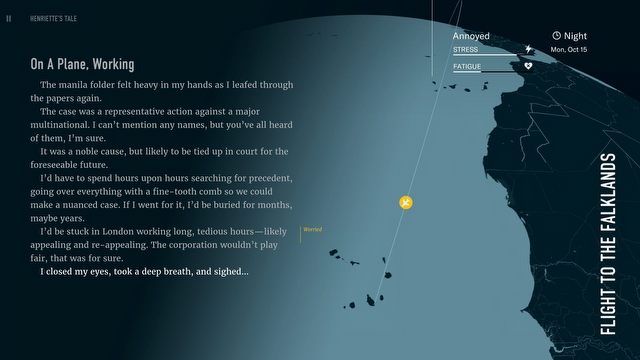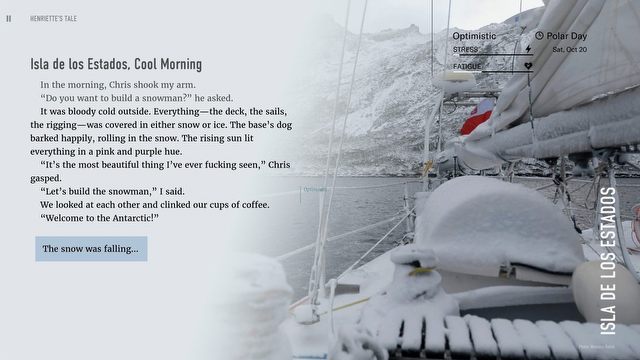Wanderlust Travel Stories Review – A Must-Read Game
Wanderlust is an unusual and bold concept of a game based on the literature of the road. The courage of the artists, who created a game consisting mostly of text, deserves admiration. And recognition, too, because Wanderlust is simply a really good game.
The review is based on the PC version.

I can be a real pain before traveling somewhere. I become irritated by anything that stands in my way, and the tiniest issues suddenly reach the proportions of a global calamity. And those damn planes – who was the genius that thought human should fly? Only once I arrive, I can take a deep breath and settle my nerves. When I landed in Tenerife in December 2018, I only relaxed after I sat down on an empty beach in the evening. A few minutes earlier, I had bought a bottle of cheap sangria to properly celebrate this moment. The ocean, murmuring in the dark, tumbled, swashed and swirled, and I lay there, drinking cheap wine, telling myself I'm calm, that I came here to rest, and that this entire setting – the ocean, the cooling beach, the empty sun loungers, gusty breeze, thousands of stars, and even this city behind me, relentlessly pulsating with the banging bass from techno parties – were there to help me with my big holiday plan.
- well-written stories – they're funny, ironic, and touching;
- characters are easy to identify with;
- game interface is intuitive;
- playing/reading will suffice for more than 15 hours;
- atmospheric, suitable music and beautiful views;
- it's boring sometimes (Martin's story mainly);
- minor impact of game mechanics (resources, money, time, fatigue, and mood).
Yes, I am a tourist. Like millions of other people, I take a vacation to get as quickly as possible to pretty, sunny locations to relax. And although I was always aware of the certain shallowness of my small trips, only after playing Wanderlust I begun to feel a little remorse. But let's start from the beginning.
What is Wonderlust?
The woman had tied her gray hair up loosely. I couldn't put my finger on her eyes. Sorrow? Or just experience? Before the others came, she was sitting alone on her Desk, writing on her laptop.
I knew the type.
She traveled all her life and had already seen everything there was to see, and yet still tried to experience something new.
Wanderlust. Travel Stories
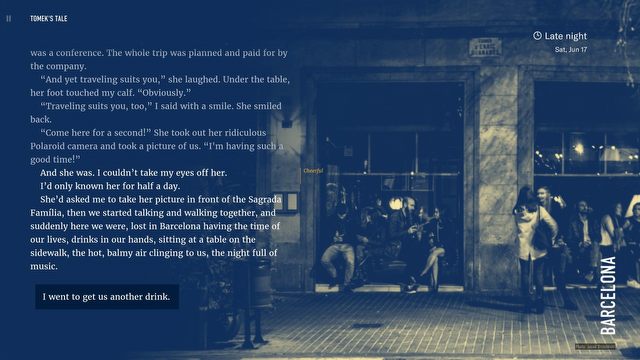
My recommendation would be to start with Tomek's story – it's a great introduction to the entire concept of the game.
Wanderlust. Travel Stories is the debut game of a Polish studio Different Tales, published by Walkabout. Funny that out of those three poper names, all have connotations of movement, travel, or tales. It's a significant hint. Wanderlust is an unusual and bold concept for a game. Classifying it in terms of genre is tricky, but the game is a blend of visual novel, paragraph games, MUD, adventure, and elements of time management.
The main premise of Wanderlust is reading and making decisions. The game shows still, neatly formatted paragraphs and photos, plays atmospheric music, and then asks us to select dialogue options, or decide what to do next. In other words, Wanderlust is like interactive literature (a hypertextual tale, as the scientists researching games would have it). In the game, you really have to read a lot. I really mean it. Wanderlust gives us stories, and the level of graphic details will depend on us and our imagination.
In other words, the game largely takes place in your own imagination, so you need to exert some creativity. In this respect, Wanderlust is an extremely engaging, but also demanding game. Thankfully, the devs made sure subsequent lines and paragraphs of text appear in intervals, so that we're not harassed with too much text at a time.
A trip to Walkabout
About a month before the game's release, I visited the developers in Warsaw to talk about Wanderlust, among other things. I was sort of taken aback by the very first question from Artur Ganszyniec, one of the creators behind this title, and that was "Do you read?" When I confirmed, he replied "So you should manage."
Arthur actually wrote a manifesto of slow gaming. In it, we can read that we need slow games for adult players inclined to critical thinking and decision making, which require not reflexes, but strong opinions and feelings. Games, in which taking a break isn't problematic, to which you can easily return after a while. If this concept sounds interesting to you, and you'd like to get to know what slow gaming is about, Wonderlust is definitely a good place to start.
Ok, so we already know what Wanderlust looks like, but the question from the headline is still valid. The short answer would be: Wanderlust is a text-based travel game. There are four long stories (and a few shorter ones), which are an account of the adventures of four fictional characters, who are far from home, in foreign countries, facing their own weaknesses, stereotypes, and beliefs.
Multi User Dungeon – what we played "before you were born"
MUD-s are a specific, now forgotten, but still existing niche of online story games. To play them, you just needed an account and a client that supported the telnet protocol (in other words, you just needed Windows and the Internet). These games boiled down to reading and writing commands. Each location was a separate, extensive literary description, and we navigated the the world by writing N, S, E, W (North, South, East, West). During the game, we did about the same thing that we do today in World of Warcraft, the only difference being that everything happened mostly in our imagination. To attack someone, you had to write "kill the goblin ", to look at something, "Look at the tree," and to buy a sword, well, you wrote "buy a sword." The game instantly reacted to our input, at once displaying new walls of text. The MUDs were multiplayer games, so we often had some company while traversing the literary depictions of the world.
MUDs were usually extensive RPGs, sometimes based on famous systems or worlds. For example you could find MUDs based on Witcher, Warhammer, The Lord of the Rings or Earthdawn.
Slow gaming – stay a while and listen
There was a sadness underlying all my thoughts. But whether it was because I was afraid of the future or because I missed the life I’d left behind, I didn’t know.
Wanderlust. Travel Stories
In Wanderlust, we have several stories to choose from – each one introducing a new character, who tells the story of a journey that important for them personally. So I'm Tomek. Last year in a pub in Barcelona I met a fantastic girl. She disappeared, leaving just a note: "Next year, same place, same time." XXX.” I don't even know her name. I'm traveling to Spain by train, hoping she'll be waiting.
I'm also Martine. I study fashion – a choice, which always seems to surprise people. I came to Thailand to find my own self, and although I spend a lot of time here, I really don't know who I am, nor who I want to become.
I'm Henrietta, a daughter of a famous photographer and traveler. Soon I will embark on a long and dangerous expedition to Antarctica, during which I will have to fight for my life and the lives of my comrades. I love the sea and the ocean.
I am Adilia, an elderly woman, an experienced traveler and a former journalist. I begin my story about Africa with the funeral of a friend in Ghana.
These four heroes will tell you about their adventures and travels. Each of them is unique, tells about various problems of human nature. You will find love, loneliness, alienation, misunderstandings, but also hope and joy. If solo mountain hikes is something you enjoy, you will presently find some familiar emotions here. My favorite stories were these of Tomek, who was trying to find a girl he met in Barcelona, and Henrietta, who, due to unfortunate circumstances, has to replace the captain of the ship she's on, and navigate the treacherous waters around the South Pole.
But Wanderlust, apart from recounting the adventures of its protagonist, also attempts to take a critical and engaged stance on today's reality. In the end, we visit different worlds, and although everything seems perfect, we quickly discover an underlying reality that's much less pleasant. The joyful surface-reality fabricated to appease the tourists obscures the drama of the native inhabitants. The game may let you realize that oftentimes, the glamorous beauty and touristic splendor come at the cost of the people who simply live in touristically attractive locations. Why did the famous film "The Beach," featuring Leonardo DiCaprio, brought the inhabitants of Ko Phi Phi much more harm than good? Why shouldn't you eat shark fin soup? Should we feel guilty after attending the Full Moon festival on Ko Pha-ngan?
Traveling can teach you a great deal, but tourism stupefies.
It was scary. I was a stranger in a strange land – insignificant and alone. The universe was just so big, was there ever going to be a place I could call home?
Wanderlust. Travel Stories
Everything in this game revolves around traveling. Wanderlust is a praise of the journey, but not of tourism. These are not stories about airline promotions and getting tanned in tourist resorts. These are, most of all, stories about human nature during a journey – the central figure is the traveler. In that sense, Wanderlust glorifies travel as few games out there, while at the same time presenting a critical attitude towards our customs, which, when pushed to extreme, result in situations that are at once amusing and terrifying, often leaving the locals perlexed.
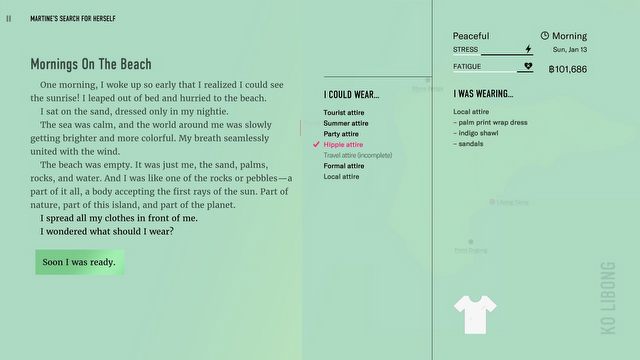
In Martine's story, you will have access to a simple clothing panel (you can buy clothes in stores).
You could argue that there's a great many games, in which the journey takes central importance, and which are also more spectacular than an interactive book. Sure, Uncharted, Tomb Raider, and even Assassins' Creed allow us to visit meticulously designed locations; there will be moments when you will stop chasing after better armor to enjoy a nice sunset, or some other vista. But it won't be long before you're back to emptying your AK-47 clips, shooting bad guys, throwing grenades around ancient ruins and speed running across rooftops of houses that predated Christ. Even in games, in which the journey is the centerpiece of storytelling – the Siberia trylogy, for instance – the destination and the end result is still more important. After all, we have to complete the game, reach the goal, realize all mission objectives. The journey still isn't the purpose in and of itself, it's just a way to achieve the ultimate goal, and thus – some kind of a reward.
When we play a good RPG, we painstakingly climb a big mountain because we expect to find some tangible reward there, rather than just to climb it. In Wanderlust we will climb this mountain only because you can see other, even bigger mountains from the summit.
The worlds prepared for us to explore in the big, AAA games are nothing more than levels in which, within the safety of the framework prepared by the devs, we pursue predetermined goals. There's indeed no journey – only tourism. And we, as we enact Nathan Drake or Lara Croft, are merely tourists visiting a perfectly safe and well-designed resort.
Meanwhile, Wonderlust bucks this trend. The only real goal is the journey. Its process and duration, the challenges it poses, and the change that happens within us throughout the trip. We can't die. We can't fail a quest. There's no powerful boss at the end, nor cut-scenes that would sum up our heroic achievements. There's only – but not merely – the tale of a person; walking, sailing, or flying, even though nobody tells them to. Here's a game with no objectives. Because the mission is simply to travel.
A game which isn't a game
I monitored myself with curiosity – it was like a change of wind on the open seas. I was becoming someone else, and I wondered who that would be.
Wanderlust. Travel Stories
And here lies the essence of Wonderlust, it's main power, but also it's main weakness. Since this is a review of a game on a gaming website, I should mention that apart from fantastically written dialogs, great pictures (taken from the personal collections of the developers and other travelers), and awesome soundtrack, the game from Different Tales also features some systems typical for video games. We have the choice and consequence mechanics, we have limited money, as well as constraints of time, energy, and mood. Depending on the decisions we make, we end up doing different things, time goes by, and the mood improves or worsens.
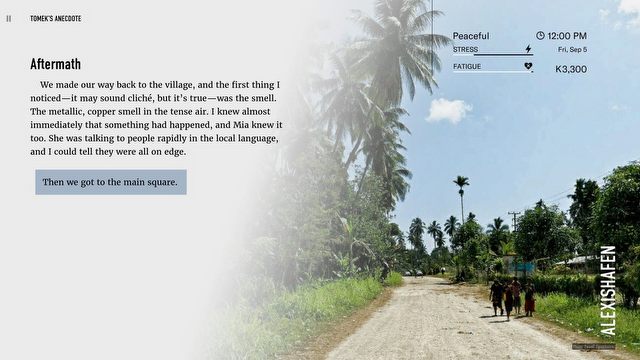
Apart from the four main stories, Wanderlust also has a few shorter (around 15 minutes) stories with different morals.
It sounds like a video game, but in actuality, all the resources and constraints don't really matter – it's not about getting to the other end in the best mood, or spending your last cash on gourmet food (which probably isn't possible, since I was spending money left and right, and still had plenty of dough in the end). Regardless of whether or not your character is tired, happy, or sad, some paragraphs will still be different, constituting the story nonetheless. Many choices are time-limited, but I never really felt any pressure. Rather, I focused on what my character thought they were doing at the time, and asked myself what I would do in the same situation – would I go to bed late in the evening, or still try to visit the city?
Wanderlust has much more in common with literature than video games. It uses some mechanics known from other games, which makes it seem more interactive, but in the end, if you give it a chance – and I believe you should – bear in mind that it's all about the story, not right or wrong choices. There are no good or bad decisions.
If you really wanted to call Wanderlust a game, it certainly is a game of feelings, dreams, and memories, which all constitute the subsequent chapters of the journey. For me, this was more of an interactive recounting of journeymen and women – stories that helped me relax after work.
Mandatory reading
To appreciate the game of the Polish indie studio, we needed particular sensitivity of the same sort as tireless fans of visual novels have. And though I'm not really a member of this lot, I appreciated a good read and a good story.
Indie game dev is characterized by some unusual features. One of the things indie developers are great at is taking completely un-sexy ideas, turning them into great games, and building communities around them. I firmly believe this is what will happen in this case.
Wanderlust is a must-read – it's not going to join the canon of literature, you won't find it in university curricula, but if you allow these tales to your room, they'll certainly make it worth. Hopefully, this will be a point in case that reading and literature aren't dying, just transitioning into a different medium.
ABOUT THE AUTHOR
I played Wanderlust for around 18 hours. The first time I saw the game was in Warsaw, where I visited the developers. A big part of my life was devoted to literature, so you could say I'm inclined to games like this one.
DISCLAIMER
We've received a review copy of the game from Walkabout Games, the publisher. Thanks!
Wanderlust Travel Stories
Wanderlust Travel Stories Review – A Must-Read Game
Wanderlust is an unusual and bold concept of a game based on the literature of the road. The courage of the artists, who created a game consisting mostly of text, deserves admiration. And recognition, too, because Wanderlust is simply a really good game.



